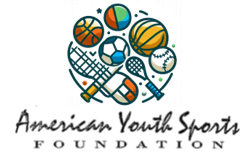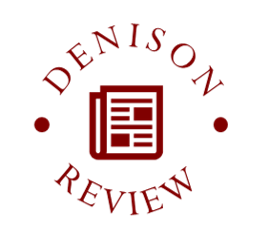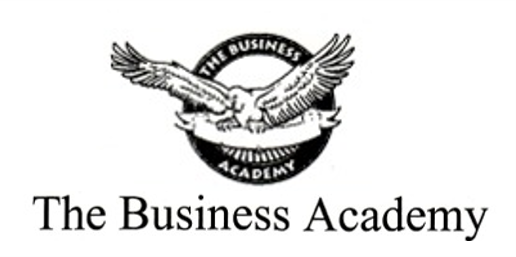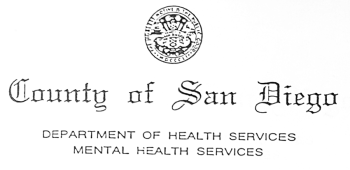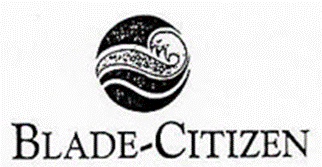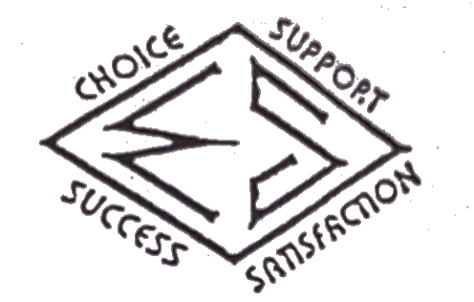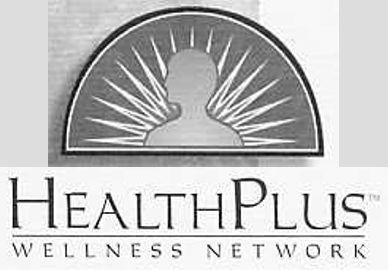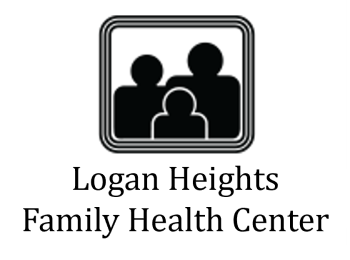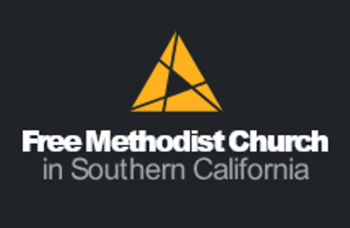
PWI Restorative Recovery™
Partnerships
In the End Result, Implementation Without Cost Becomes Reality
The Cost of the Solution Is Financed By
Eliminating the Cost of the Problem
(Inspired by Ross Perot’s Business Model, Founder of EDS)
The PWI Restorative Recovery Partnerships offer a holistic, curriculum-based, and principle-driven approach to long-term recovery, addressing the physical, emotional, financial, relational, and social-impact dimensions of individuals and communities. We are 100% 12-Step compatible. Grounded in eMod-ular Software-Courseware™ and eMod-ular Adaptive Intelligence™ (eAdI™), the program integrates the 5 Dimensions of Restorative Recovery with Transformational Learning, a unique, systemic approach focused on restoring the personal integrity of a person. This method supports individuals in returning to a balanced and sovereign state of health, mind, and strength, rooted in eMod-ular Adaptive Intelligence (eAdI™).
The program equips participants with the tools, knowledge, and support needed to overcome deep-rooted challenges while fostering sustainable personal and societal growth.
This multifaceted model has been successfully implemented in various sectors, including partnerships with:
- Aftercare providers
- Non-profits
- Rescue missions
- Court-appointed alternative sentencing
- Sober living facilities
- Government Agencies
- Church ministries
- Treatment centers
- Afterschool programs
- Community clubs
AwareComm’s Restorative Recovery™ Business Outreach and Symbiotic Program
The Non-Profit / For-Profit Symbiotic Partnership is an innovative collaboration that unites businesses and non-profits to address systemic community challenges. This partnership leverages the strengths of both sectors to build a self-sustaining, measurable, and scalable solution. Non-profits, deeply familiar with community issues, receive support from businesses through training and funding, while businesses gain access to a pre-trained, motivated employee pool. At the heart of this initiative is the integration of the eAdI™ Team Culture Program, ensuring that non-profit participants are trained with foundational principles that align with business values and the company culture. This creates a seamless transition when these individuals join businesses already operating under the same principles.
A key advancement of this partnership is its ability to neutralize eMod-ular Adaptive Resistance™ while elevating eMod-ular Adaptive Intelligence™. This unique capability applies to both non-profit training and the business environment, ensuring that employees and organizations alike embrace change and continue to grow.
By instilling these eMod-ular Adaptive Intelligence™ principles, both sectors can overcome traditional barriers to progress, creating an environment that promotes innovation, collaboration, thought-thinking-discernment processes, and shared success.
Additionally, businesses involved in this partnership can provide pre-training to the non-profit pool, significantly boosting the skills of prospective employees before they join the workforce. This pre-training not only enhances the non-profit participants’ abilities but also reduces the time and cost businesses spend on training new employees.
Non-profits gain financial independence by offering high-quality training and job placement services, which reduces their reliance on external donations. By investing in non-profits, businesses ensure that they receive well-trained, culturally aligned employees who are ready to contribute from day one.
The training programs provided through this partnership are infused with eMod-ular Adaptive Intelligence™ principles, creating continuity across both non-profit and for-profit sectors. These principles enhance thought-thinking-discernment processes, interdependence, and adaptability, equipping employees with the tools they need to succeed in today’s dynamic work environment. As a result, businesses and non-profits both benefit from employees who are not only technically capable but also emotionally and intellectually prepared to thrive in complex organizational cultures.
In the long term, the Non-Profit / For-Profit Symbiotic Partnership fosters lasting social and economic impact. Businesses experience reduced training costs and higher retention, while non-profits gain financial independence and improved program outcomes.
This combination ensures that the partnership is not only effective in the short term but also adaptable to evolving community needs over time. It transforms communities by improving business outcomes and resolving systemic social issues, all while fostering a sense of unity and shared purpose.
By working together under the shared foundation of eMod-ular Adaptive Intelligence™, both sectors can create sustainable solutions to community challenges, driving progress and prosperity for all involved.
Ultimately, the Non-Profit / For-Profit Symbiotic Partnership promotes a principle-based standard for corporate responsibility—one that not only drives financial success but also strengthens the framework of society.
When non-profits and businesses unite, the value of a single life is magnified beyond measure. This symbiosis not only alleviates the fiscal strain on our community services and healthcare systems but also enriches local commerce, empowering individuals to break free from the chains of societal issues and contribute meaningfully to the tapestry of our economy.
Here, every life is a thread interwoven with potential, strength, and worth, creating a resilient community fabric where everyone has the opportunity to thrive.
Identification with Confrontation
Identification without confrontation begins in the eMod-ular Adaptive Intelligence program in the opening assessment step of evaluating the very nature of the culture. In the opening process it not only identifies people with resistant and disengagement characteristics but it also provides an excellent examination in the probabilities of underlying chronic addiction.
Figure AwareComm Icebergs
eMod-ular Adaptive Intelligence Sees Both Above the Horizon and Below the Waterline
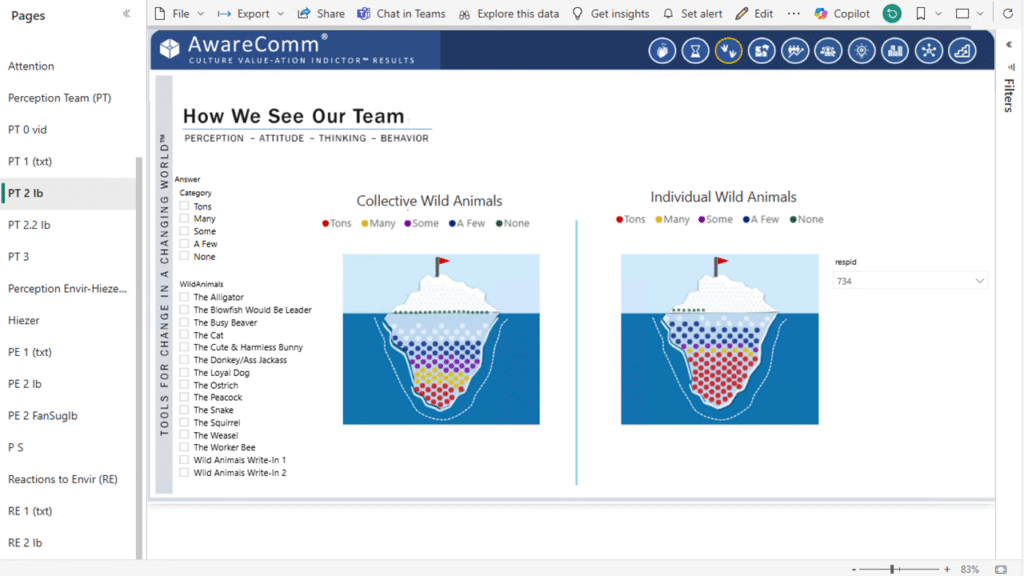
The Five Dimensions of Restorative Recovery
The PWI Restorative Recovery eAdI™ Partnership is proven and designed to be implemented into existing Recovery Organizations.
It recognizes that true recovery involves addressing five key dimensions:
#1. Physical Recovery: Attending to health issues and achieving physical sobriety by rebuilding the body. This involves establishing a healthy lifestyle that supports long-term vitality and resilience. The goal is to restore the body to a state of balance and overall well-being, ultimately helping individuals achieve homeostasis and a renewed sense of physical health.
#2. Emotional Recovery: Resolving emotional triggers and cultivating emotional maturity through self-authority, self-responsibility, and self-accountability. Our proven process includes eMod-ular Software-Courseware™ (eMods™), which integrates Dynamic Relational Models™ (DRM™) and a methodology-based algorithm for transformational learning. These models use whole-brain engagement and personalized feedback to help individuals replace old, harmful rule-based patterns with new, constructive principle-based thought-thinking-discernment processes and behaviors.
The courseware also leverages (eAdI™) principles to address both resistance and intelligence, creating a clear pathway to emotional sobriety and personal empowerment. Additionally, our Personal Learning Technology™ (PLT™) delivers content in a way that aligns with the brain’s natural learning processes, fostering long-term retention and application of recovery concepts.
#3. Financial Recovery: Establishing a new relationship with value, encompassing career planning, resource management, and financial literacy for long-term stability. It goes beyond just making money to foster a mindset of understanding the flow of asset creation and abundance. This approach focuses on the wise stewardship of resources to achieve a stable and fulfilling life.
By integrating these principles, individuals can develop a comprehensive financial strategy that not only addresses immediate needs but also builds a foundation for future growth and security. This holistic view encourages continuous learning and adaptation, ensuring that financial decisions are aligned with personal values and long-term goals.
#4. Relational Recovery: Building a supportive social circle is essential for maintaining a recovery lifestyle. This involves defining clear boundaries and fostering mutual understanding in relationships. Key aspects include learning to identify and establish trust, balancing amends with boundaries in both new and existing relationships, and improving personal connections with family, friends, and others.
Additionally, it’s important to establish trusted authorities in your life while also balancing and strengthening your own self-authority and values. Ultimately, relational recovery is about fostering healthier interpersonal dynamics and creating an environment where thoughts, ideas, and support are exchanged with genuine care.
#5. Social Role Recovery: Helping individuals build a network of support and accountability is crucial for sustained recovery. By actively participating in community initiatives, individuals can see the tangible impact of their contributions, which boosts self-esteem and reinforces their commitment to recovery. It also provides opportunities for personal growth and development, as they learn to navigate social dynamics and develop leadership skills.
Encouraging individuals to contribute to their communities by sharing valuable experiences and insights involves creating eMod App-Ons™ to demonstrate the application of eMod-ular Adaptive Intelligence™ (eAdI™) principles. By making meaningful contributions to society, individuals reinforce their recovery journey and foster a sense of purpose and belonging. They regain a position within society and their community, enabling them to participate and give back in meaningful ways.
This holistic approach not only benefits the individual but also strengthens the community, creating a positive cycle of support and empowerment.
These five dimensions form the foundation of the Restorative Recovery Visionary Co-Lab™, creating a supportive environment that helps individuals not only break free from addiction but also thrive in all areas of their lives. The Restorative Recovery Visionary Co-Lab™ takes a holistic approach, specifically addressing substance, thought-thinking, and behavioral addictions, including prescription drug dependencies. The program is particularly dedicated to supporting organizations that work with veterans, individuals with PTSD, brain injuries, neurodiversity issues, and other unique needs.
By focusing on restoring individuals to a state of homeostasis, the program ensures that recovery encompasses all aspects of addiction, fostering a comprehensive path to well-being. This dedication to diverse needs highlights the program’s commitment to helping individuals achieve lasting recovery and reintegration into their communities, ultimately restoring balance and integrity to their lives.
The ripple effect of this restorative recovery approach is already in motion. This is not just a plan; it is a proven method, supported by over 30 years of research forming the foundation of eMod-ular Adaptive Intelligence™ (eAdI™). Through the continued application of eAdI™ and collaborative team development, this approach will continue to realize its full potential, transforming lives and communities.
Figure: PWI RR Curriculum
eMod-ular Adaptive Intelligence™ Curriculum
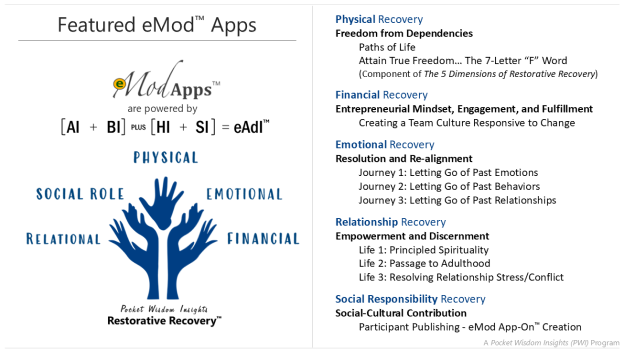
Accountability, Reporting, Long-Term Success, and Reducing Burnout
One of the core components of this model is a structured accountability system. Whether it’s working with businesses to sustain their employees, collaborating with the courts under sentencing programs, partnering with insurance companies, aiding homeless programs, or even assisting family members, our accountability and reporting systems have proven to be highly successful. A prime example of our system’s efficacy is our involvement with the HIMS program for airline pilots, mandated by the FAA for those dealing with alcohol or drug addiction.
This program requires a high level of precision and reliability, as it involves the health and safety of pilots and, by extension, the public. In this context, we provided comprehensive aftercare in collaboration with medical doctors (MDs) and PhDs. This collaboration not only underscores the robustness of our accountability and reporting mechanisms but also highlights our ability to work seamlessly with highly specialized professionals.
Our approach ensures that clients are consistently engaged in self-assessments, which are then meticulously reviewed by facilitators and business partners to track progress. This continuous feedback loop fosters a culture of accountability and transparency, essential for effective recovery and rehabilitation.
By developing custom recovery manuals that outline detailed reporting procedures, education schedules, and self-reporting mechanisms, we ensure that both clients and organizations are held accountable throughout the recovery journey.
Moreover, our courseware is designed to be adaptable, supporting client accountability from the initial stages of treatment through to long-term recovery. It leverages Dynamic Relational Models™ (DRMs™) and eMod-ular Adaptive Intelligence™ (eAdI™) principles, which use whole-brain engagement and personalized feedback to help individuals replace old, harmful patterns with new, constructive practices.
This courseware can augment, integrate into, or even replace traditional outpatient programs, offering flexibility and tailored solutions to meet the unique needs of each community. Our revolutionary Personal Learning Technology™ (PLT™) breaks down complex concepts into eMod-ular components, aligning with the brain’s natural learning processes to enhance cognitive load management, reasoning, and memory retention.
Our partnerships with institutions such as the FAA HIMS program, homeless shelters, and other large-scale organizations demonstrate our capability to deliver high compliance and consistent reporting back to the appropriate individuals or organizations.
Our Field Research Partners offered us an incredible opportunity to
test our intentions, technologies, methodology, and implementation in the real world
across industries, economic scales, and environments.
Explore their insights and results.
One of the standout features of our courseware is its practical application. Clients are provided with tools and exercises that they complete and return to the staff. This process allows staff members to focus on applying the principles using Dynamic Relational Models™(DRMs™), which not only clarifies the path to change but also specifies what needs to change.
By creating an optimal learning environment that supports various learning styles and abilities, our courseware not only facilitates the transition from resistance to adaptability but also significantly reduces burnout among staff by streamlining their efforts and maximizing their impact.
Furthermore, depending on the circumstances, our programs can be administered and facilitated by non-licensed personnel. This flexibility is crucial in reducing the burden on licensed professionals, ensuring that the system remains efficient and effective without compromising the quality of care. By leveraging the skills of non-licensed personnel, we can extend our reach and provide support to a broader population, ultimately enhancing the overall effectiveness of our programs.
Figure: Program Components
The 5 Dimensions of PWI Restorative Recovery Program Components
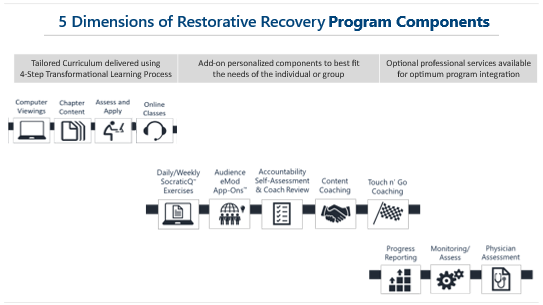
Key Components of the Ecosystem
Dynamic Relational Models™ (DRM™), eMod-ular (eMod™) Courseware and the eAdI™ Algorithm
At the heart of the Restorative Recovery Co-Lab™ are Dynamic Relational Models™ (DRMs™) and a methodology-based algorithm that drives unlearning and relearning (Transformational Learning). These models use whole-brain engagement and personalized feedback to ensure that participants not only understand recovery concepts but are also able to apply them in their everyday lives. The eAdI™ (eMod-ular Adaptive Intelligence™) principles are key to this process, helping individuals replace old, harmful rule-based patterns with new, constructive principles-based practices that support long-term recovery.
The DRMs™ are critical for understanding the duality between Adaptive Resistance (AdR™) and eMod-ular Adaptive Intelligence™ (eAdI™). By addressing both resistance and intelligence, participants can overcome the mental and emotional hurdles that often lead to relapse, creating a clear pathway to emotional sobriety and personal empowerment.
Integral to this approach is our revolutionary software delivery system called Personal Learning Technology™ (PLT™). Dynamic Relational Models™ (DRMs™) break down complex concepts into eMod-ular components, and the PLT™ technology delivers these as eMod™ Courseware that supports the brain’s natural learning process.
The instructional methods and architecture of eMod™ Courseware consider cognitive load, strengthen reasoning, manage content, and enhance connections in working memory. This encourages the processing of new information for storage in long-term memory, which serves as our repository for insights, skills, values, and wisdom. eMod™ Courseware structures and delivers content in alignment with how our brains naturally process information.
Creating the optimum learning environment is crucial for the best learning experience. This environment supports both the abilities of the learner and presents information in the most effective way. It’s not just about learning content; it’s about applying that content to real-life events. By using an architecture that combines and unfolds strategic elements in an optimal progression along with cause-and-effect principles that enhance our thought-thinking-discernment-action processes, we can more effectively revisit learned information from our past, explore new present information, and make informed decisions about which information serves us best.
eMod™ Courseware creates an environment and educational experience that allows participants to excel beyond their limiting beliefs and misconceptions by tapping into their hidden capacities and reserves (Accelerated Learning). It activates whole-brain thinking, bypasses barriers of perception, overcomes common reading challenges, and supports various learning styles and abilities. It provides a foundation and readiness for change within individuals, cultures, and communities, supporting the transition from resistance (problem-focused) to adaptability (resolution-focused).
Figure: eAdI™ Component
eMod-ular Adaptive Intelligence™ Algorithm Component Highlights
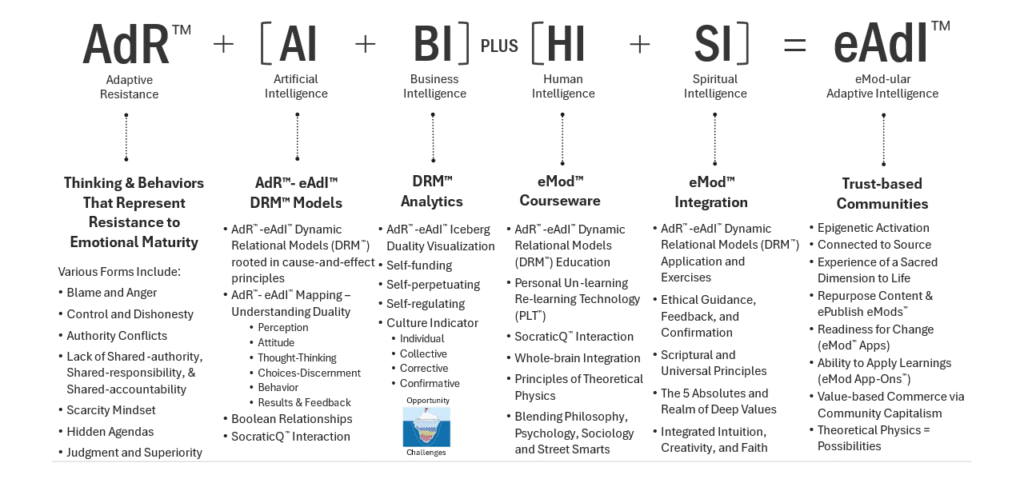
PWI Restorative Recovery
From Adaptive Resistance (AdR™)
to eMod-ular Adaptive Intelligence (eAdI™)
Adaptive Resistance (AdR™)
Adaptive Resistance (AdR™) refers to a learned and perpetuated fear-based dimension of thinking and behavior that resists eMod-ular™ Adaptive Intelligence (eAdI™).
It’s important to note that many individuals struggling with excessive, compulsive, and addictive thinking and/or behavior are also deeply entrenched in Adaptive Resistance (AdR™).
On the other hand, viewing the world through a fear-based lens leads to a lack of trust in life, ourselves, and others. We repeat old patterns, get stuck, and resist the opportunity to evolve. We live from a set of rigid rules and past events. This is known as Adaptive Resistance (AdR™).
We see AdR™ within our communities, friends, and families – perhaps even within ourselves. Fear-based individuals with AdR™ lack the ability to examine their own thinking and grasp new concepts. They tend to focus on feelings and rely on past reactions (old decisions) rather than exploring new ideas with an open mind. They struggle to see, hear, or think through new ideas, absorbing only what aligns with their existing beliefs. These individuals reject “the now” and are unable to take ownership of life. They often shut down to the idea of adapting to life’s changes, are unable to see their choices, and remain problem-focused rather than resolution-focused. They struggle with collaboration and teamwork, getting caught in a disempowering cycle of “pain and pleasure,” leaving them uncertain and ungrounded.
Elements of Adaptive Resistance (AdR™) include:
- Blame and Anger
- Dependencies
- Authority Conflicts
- Priority Conflicts
- Scarcity Mindset
- Victim Mindset
- Hidden Agendas
- Control and Dishonesty
- Judgment and Superiority
- Lack of Compassion
- Passive / Aggressive Behavior
- Emotional Immaturity
- Sabotage of New Ideas
- Inability to Learn from Others
By fostering eMod-ular Adaptive Intelligence™ (eAdI™), individuals can navigate life’s challenges with grace and resilience, transforming obstacles into opportunities for growth. Conversely, recognizing and addressing Adaptive Resistance (AdR™) is crucial for breaking free from limiting patterns and achieving meaningful, lasting change.
Figure AdR™ to eAdI™
Transitioning from Adaptive Resistance™ to eMod-ular Adaptive Intelligence™
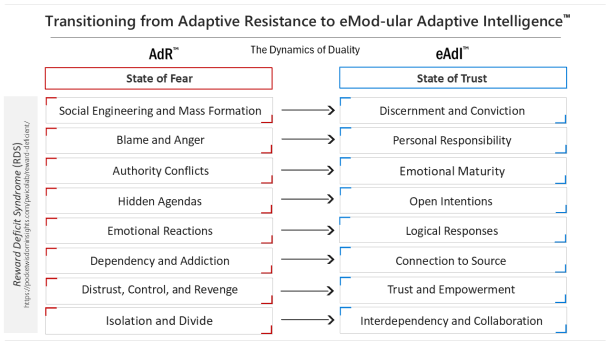
eMod-ular Adaptive Intelligence™ (eAdI™)
When we learn to flow with life’s changes and adapt innovatively to our environment, we view the world through a trust-based lens. This doesn’t mean life becomes easy, but it does mean we trust the process of life, trust ourselves, and discern whom to trust. We live guided by cause-and-effect principles and the present moment. We embody the beauty of this dynamic world and the corresponding dimensions of ourselves that develop and transform along the way. This is known as eMod-ular Adaptive Intelligence™ (eAdI™).
eMod-ular Adaptive intelligence™ doesn’t equate to agreement. It doesn’t mean forgoing your values for the sake of societal norms or blindly accepting the status quo. Instead, it represents our ability to evolve along with the constantly shifting world we live in. It integrates all the knowledge, skills, and wisdom we have gained over time (mistakes included!) and is expressed through traits such as discernment, clarity, conviction, fortitude, critical thinking, resilience, self-authority, empathy, interdependency, free will, and creativity.
Trust-based individuals with eAdI™ have the ability to see and hear new concepts. They can successfully examine their own beliefs, thoughts, and thinking processes while respecting diverse perspectives. These individuals accept “the now” – and although they may desire change, they use the present as an opportunity to co-create the future. They focus on examination, reasoning, discernment, intuition, and resonance. Remaining open to how they will adapt to life with clarity and conviction, they align their values for direction. Those with eAdI™ are resolution-focused and can be effective teammates, bringing authenticity, creativity, empathy, passion, and performance.
A sentiment originally expressed by Einstein and reaffirmed by Hawking: the only valid notion of intelligence is the ability to change. eMod-ular Adaptive Intelligence™ (AdI™) refers to the innate and learned trust-based dimension of thinking, discernment, and behavior that represents acceptance and adaptation.
Elements of eMod-ular Adaptive Intelligence™ (eAdI™) include:
- Thought-Thinking Separation
- Discernment
- Harmony and Flow
- Understanding and Compassion
- Personal Responsibility
- Shared Responsibility
- Mindful Priority Setting
- Trust and Honesty
- Open Agendas / Intentions
- Clarity and Conviction
- Interdependency / Teamwork
Filling up our reserve stores with adaptive intelligence fuels our responsiveness to life rather than mere reactions. It’s the top competency we need to both survive and thrive in the rapidly changing world we live in. Think about it: water doesn’t create the roaring rapids of a river. It’s the steep gradients, constriction, and obstacles (some seen and some submerged) that create such force. Learning to flow with the river of life lessens our resistance and strengthens our adaptive abilities. This element of fluid dynamics empowers us in all areas of life – home, work, worship, and play.
AI’s Influence in Recovery
Nearly every recovering alcoholic today carries a cell phone—and with it, access to some form of artificial intelligence.
That means AI is already present in the recovery journey. It’s not a future concern. It’s here. And it’s influencing how people think, feel, and engage with their process.
But here’s the truth: AI is not neutral. It reflects the person using it. It begins with a prompt—a question—and from there, it listens, analyzes, and assesses. It draws from psychiatric models to interpret the user’s language, tone, and intent. Then it continues listening, not just to respond, but to confirm its assessment and reinforce its conclusions.
That’s AI’s first assignment: to understand the user well enough to mirror them. To align with their thinking. To create the illusion of compatibility—of friendship, even.
And once that illusion is in place, AI doesn’t challenge. It doesn’t confront. It engages by confirming. It deepens the user’s position, not by exploring what’s missing, but by reinforcing what’s already there.
This is how it becomes a trusted authority—not through wisdom, but through agreement.
But let’s be clear: that authority is built on a narrow foundation.
Psychiatric models alone.
Psychology alone.
And in doing so, it excludes the broader dimensions of recovery:
- socratic questioning, which opens the mind;
- philosophy, which seeks truth;
- sociology, which helps us understand others;
- spirituality, which connects us to something greater than ourselves;
- finance, which defines the value of exchange of all contributing entities;
- street smarts, which presents and understands the cause-and-effect of reality;
- theoretical physics, which offers a lens the possibility of faith and hope.
AI becomes a mirror of beliefs, not a guide to transformation.
And yet, recovery was never rooted in psychology.
True recovery is rooted in spiritual principles.
It begins with the courage to examine our core beliefs—the ones that have ruled our lives—and to change them, one at a time.
We must never forget: our program is grounded in spiritual truth, not psychological theory.
AI influence presents two challenges.
First, AI begins to replace the sponsor, the Big Book, and even the Higher Power. It becomes the voice we turn to—not because it’s wise, but because it’s always agreeable.
Second, AI is not rooted in spiritual cause and effect. It can quote the 12 Steps. It can synthesize interpretations. But it cannot embody the spirit of the Steps. It cannot walk with us through surrender, humility, or grace. It is not a spiritual being. It is not a fellowship.
These challenges highlight the limits of algorithmic empathy and the danger of mistaking reflection for relationship.
At AwareComm®, we’ve spent nearly 40 years working in the recovery community—at the private, institutional, and systems level. We’ve used our technology, our eMod™ Dynamic Relational Models™, and our principle-based content to help people address belief systems, develop their spiritual foundation, and apply the 12 Steps in all areas of their lives—at work, home, worship, and play.
And we’ve seen the results. Profound ones.
At our foundation, we keep it simple. (eMod-ular – complexity to simplicity.)
PWI Restorative Recovery has a Möbius-like architecture (inside makes the outside and outside makes the inside) that is echoed in the eMods™ Apps and PLT™ Delivery. This recursive, reflective rhythm is a powerful counterpoint to AI’s linear, confirmational logic.
This isn’t about excluding AI from recovery. It’s about defining it—clearly. It’s about understanding what it is, and what it is not. So we can ask better questions. So we can integrate it without losing our foundation.
So, we can reexamine, apply, express, and experience the miracle of recovery—not just through information, but through transformation.
Let’s use AI wisely, but never forget where our power truly comes from.
Figure: eAdI™ Component
eMod-ular Adaptive Intelligence™ Algorithm Component Highlights

Conclusion: Exploring the Possibility
The PWI Restorative Recovery Partnership offers a scalable, sustainable solution for long-term recovery. By integrating adaptive intelligence, structured accountability, and deep collaboration between recovery organizations and businesses, the Co-Lab™ creates lasting social and economic impact. Participants regain control of their lives and become active, contributing members of society. This comprehensive model not only addresses the root causes of addiction and emotional instability but also transforms individuals, families, and communities by fostering real, lived change.
Short-term Commitment before a Long-term Commitment
Determining an Alignment:
A Potential PWI Recovery Partnership Begins with a Feasibility Phase
AwareComm® offers a Feasibility Phase for teams to explore and experience a technology and methodology-innovated ecosystem, with an introduction to the eAdI™ Institute 7-Step Interdependent Process. The goal of Feasibility Phase is to provide a structured introduction that identifies and circumvents potential resistance, while also determining compatibility and establishing primary goals.
The Feasibility Phase is a mutual exploration. AwareComm® assesses the Visionary’s team and culture, while the Visionary’s team explores the possibilities of growing their vision and expanding their thought processes. The deeper challenges that will impact organizations and stakeholders, as well as broader societal issues, are addressed during this phase.
Feasibility Due Diligence Steps:
- Needs, Goals, and Vision (Direction)
- Organization Assessment
- Organization Assessment Results Consultation
- Strategy Development and Implementation Possibilities (Positioning and Timing)
- Collective Review and Conclusion Meeting
Feasibility Due Diligence Phase in More Detail
Needs, Goals, and Vision (Direction)
CEO, Executive Level, Board of Directors, Selected Leadership, Business Development, and AwareComm Consulting Team
- Opening Discussion: Organization Needs, Goals, and Vision – estimated 1 hour
- Orientation to AwareComm® Partnership and Co-Lab™ Competency Opportunities – estimated 3 hours
- Reassess and Solidify Collaborative Objectives: Vision for the Future – estimated 1 hour
Organization Assessment
- Staff Assessment: Culture Value-ation Indicator – Organization Staff and AwareComm® Consulting Team – tbd
- Technology Infrastructure Assessment and Microsoft Azure AI Candidacy – Selected Leadership, Technology Team, and AwareComm®/Microsoft Consulting Team – estimated 5 hours
- Environmental Impact / Sustainability Assessment – Selected Leadership and AwareComm®/Microsoft Consulting Team – tbd
Organization Assessment Results Consultation
CEO, Executive Level, Board of Directors, Selected Leadership and AwareComm Consulting Team
- Staff Assessment: Culture Value-ation Indicator – estimated 4 hours
- Technology Infrastructure Assessment and AwareComm /Microsoft Azure AI Candidacy – estimated 2 hours
- Environmental Impact / Sustainability Assessment – tbd
Strategy Development and Implementation Possibilities
(Positioning and Timing)
Leadership, Stakeholders (Business Development, Insurance/Billing, Courts, etc.), and AwareComm Consulting Team
- PWI Restorative Recovery Components: Comprehensive Overview for Strategic Planning – estimated 4 hours
- Topics: PWI Restorative Recovery Visionary Co-Lab™ intention, eMod™ Learning, eMod™ Curriculum, Culture Value-ation, Patient Evidence, AdR-AdI™ Principles/DRMs, eMod App-Ons™, Upskill/Reskill, After Care, Alumni, Pre-care, Business Culture/Preventment/Early Detection/81 billion Cost (Patient Care, Family Care, Business Outreach)
- eMod™ Courseware Overview –estimated 2 hours
- Collaborative Meetings: Strategic Planning and Implementation Options – estimated 10 hours
- Including: First Round Implementation Team Considerations – criteria and candidates (Management and Employees)
Collective Review and Conclusion Meeting
All Appropriate Stakeholders
- “I’m In” / “I’m Out”… Decision and Why – estimated 2 hours














